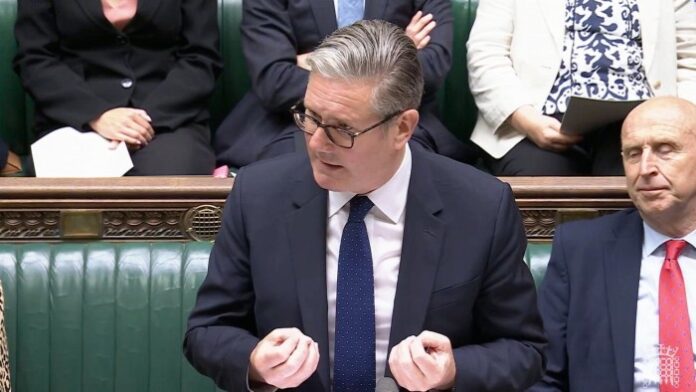Unlock the Editor’s Digest for free
Roula Khalaf, Editor of the FT, selects her favourite stories in this weekly newsletter.
Sir Keir Starmer gave rebel Labour MPs expensive concessions on welfare cuts on Thursday as the prime minister sought to defuse the biggest political crisis of his first year in office.
Leading rebels said they had been promised “significant changes” to welfare legislation that some MPs believed would be enough to avert a defeat for the government in the House of Commons next week.
Starmer offered to limit cuts to the main disability benefit to new claimants at a cost of £1.5bn a year, bring forward a £1bn package of employment support payments to this year, and consult on the reforms, according to MPs.
The compromise would reduce the £5bn in annual savings the government had hoped to make from the bill.
“These are significant changes, they’ve listened and they’ve heard and they’ve made the changes,” the MP said. “I think colleagues will be won over.”
But another influential rebel said they were not yet ready to capitulate. “MPs will be mad to accept concessions on trust until they’ve seen them in black and white, I still want them to pull the bill, because some of us simply don’t trust them,” they said.
Starmer’s offer on Thursday followed a week in which Labour MPs have been threatened with deselection or having funding stripped from their constituencies if they derail the welfare reforms.
With Starmer trying to fend off an uprising by more than 120 Labour MPs, one rebel said the government’s “brutal” approach had threatened to unleash a “civil war”.
MPs said earlier on Thursday that Number 10 appeared to be targeting the “leaders” of the revolt in the talks, but backbenchers insisted that they would need to see real change. With more names joining the rebellion, the number of MPs prepared to sign a “reasoned amendment” against the welfare bill had increased to 126.
There were frantic calls on Thursday evening between Labour MPs seeking to digest the details of the potential compromise and work out whether they would pull their names from the rebel amendment, which was designed to scupper the legislation at its second reading.
The prospect of a defeat has been highly embarrassing for a government that has a huge working majority of 165 seats and would threaten to undermine Starmer’s standing just before the anniversary of his general election win next week.
The prime minister has also been warned by City analysts that a retreat would make it even more likely that his struggling Labour administration will have to put up taxes in the autumn Budget.
Ministers are running out of time to hammer out a compromise, with the bill’s second reading in the Commons due on Tuesday. The legislation would then be rushed through parliament, with its third reading only a week later — leaving MPs with little time for further debate.
“All colleagues want to get this right, and so do I,” Starmer told MPs on Thursday. “We want to see reform implemented . . . that conversation will continue in the coming days, so we can begin making changes together on Tuesday.”
Health secretary Wes Streeting told the FT: “Keir and [deputy prime minister] Angela Rayner have been working intensively with [work and pensions secretary] Liz Kendall and MPs to try and get everyone back on the same page.”
The rebels, who include 10 chairs of select committees, stunned Downing Street when they announced on Monday night that they would put forward a “reasoned amendment” to torpedo the welfare bill.
As well as the opposition from dozens of rank-and-file MPs, there were also a handful of junior ministers and parliamentary aides understood to be on the brink of resignation if the government ploughed ahead.
Toby Perkins, a moderate MP who joined the rebellion on Wednesday night, said: “I fear that the changes . . . will hit too many disabled people, many of whom really need the payment in order to be able to access work or to cope with their disability.”
The legislation is designed to address the fact that 2.8mn people in the UK have a long-term health condition that prevents them from working, while the government says one-in-10 working-age adults claim a health-related benefit.
Kemi Badenoch, the Conservative party leader, has vowed aggressive cuts to welfare if elected, saying on Thursday that the number of people now registered as disabled in the country was “extraordinary”. However, the Tories have said they will only back the bill if Labour accepts several amendments the government deems unpalatable.
Reforms to both disability and incapacity benefits are expected to save the Treasury about £4.8bn, according to government estimates. Rachel Reeves, the chancellor, is seen by rebels as one of the biggest obstacles to agreeing concessions.
Ministers already need to find £1.25bn to pay for a U-turn last month when they decided to retreat from mass cuts to the winter fuel payment.
“The possible U-turns on benefit and welfare spending have left the chancellor in a sticky position,” said Capital Economics’ Ruth Gregory, who predicts the chancellor may need to raise between £10bn and £20bn in the Autumn Budget.
“If the chancellor wishes to avoid an adverse reaction in the financial market, she probably has little choice but to raise taxes in the Autumn Budget.”
One of the rebel ringleaders told the FT: “Tinkering with the eligibility criteria would not end this; what we are looking for is a wholesale rethink by the government, and now that they’ve seen the level of unhappiness in the [Parliamentary Labour party] they should consider very carefully.”


